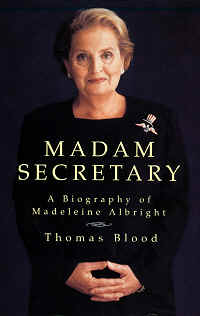Review: Madame Secretary

- Title
- Madame Secretary: A Biography of Madeleine Albright
- Author
- Thomas Blood
- Publisher
- St. Martin’s Press, 1997
- ISBN
- 0-312-17180-3
Review Copyright © 1997 Garret Wilson — December 28, 1997, 3:00pm
Imagine that you are attending a birthday party for Madeleine Albright, the current US Secretary of State. For a birthday present, someone close her decides to write a short overview of her wonderful accomplishments. Or instead imagine that Madeleine, through heroic skill and determination, saved someone from a gruesome death, and that person, forever indebted, put together a short biography to commemorate his/her savior.
Although neither of these scenarios is factual, each is a quite plausible explanation for the content of Madam Secretary, A Biography of Madeleine Albright by Thomas Blood. The author is CEO of "a prominent Washington-based lobbying firm" and has "spent the last seventeen years in the political arena." He has not yet entered my list of favorite authors, however.
Madam Secretary, while written on a ninth grade reading level and in a very informal style, the author assumes that you are very familiar with current political developments, the game of politics in general, and all the current and past players. Thomas Blood assumes everyone knows the beginnings and the details of the Bosnian crisis. In chapter four, "The Undiplomatic Diplomat," Blood continuously describes Albright’s dealings with someone named Muskie. Someone unfamiliar with the political sphere would have to find the lone sentence at the bottom of page 84, which explains that Edmund Muskie is "the legendary senator and former secretary of state."
Everyone in this book are either "legendary" heros or evil foes. Madeleine Albright, "who had been the object of [General Colin Powell’s] wrath for months" (p. 163), is described as winning "a battle of wills with her detractors by taking on the biggest, toughest guy in the neighborhood [Powell], the guy everybody else was afraid to challenge" (p. 167). Chapter Eight, "Test of Wills," describes the ousting of United Nations Secretary General Boutros Boutros-Gali as a battle between only two people, Boutros-Gali and Albright, who "had taken on a fight no one in the administration wanted, but which everyone agreed had to be won" (p. 215).
The inside cover of the book explains that instead of "providing a simple chronology, Blood focuses on the defining moments in Madeleine Albright’s life," which helps to set the stage for what’s inside: an Impressionistic painting of one person’s achievements. With a little brush stroke here and a little brush stroke there, Blood paints a portrait that is blindingly vibrant in almost gaudy colors but virtually lacking of definition and detail.
I had been impressed with Madeleine Albright before reading this book, but the descriptions of her in these pages are lavish to the point of seeming ridiculous. Blood continuously praises Albright, who "characteristically put duty before career" (p. 7), "exhibited tremendous restraint" (p. 21), experienced "a rare case of nerves" (p. 24), is "not a person accustomed to inaction" (p. 25), and "characteristically...didn’t miss a beat" (p. 34), all in the first few pages. I am sure that Madeleine Albright is a wonderful, intelligent person, but her being described in this book as barely short of perfect seems somewhat artificial.
I was expecting more of a historical book, a factual examination of someone’s life in an objective tone. What I found was information that was interesting but "fluffy," as it were, with not much real substance. If you want to learn more information about Madeleine Albright, any information at all, and you don’t mind if it comes in the style of a newspaper gossip column, you can certainly pick up some interesting tidbits in Madam Secretary. But if you are looking for some serious presentation of facts in a little more professional, objective style, I would recommend you look elsewhere.
Copyright © 1997 Garret Wilson